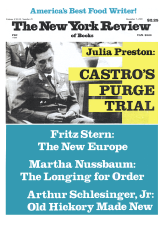In response to:
Sylvia Plath: An Exchange from the October 26, 1989 issue
To the Editors:
In his letter replying to mine [NYR, October 28] on the subject of his review of Anne Stevenson’s biography of Sylvia Plath Bitter Fame [NYR, September 28], A. Alvarez has changed his tune. No longer wanting Sylvia shown only “in a good light,” he now favours a “rounded” biography with her “personal failings as well as strengths.” If he would read Bitter Fame calmly, shedding for a moment the illusion that only his view of Plath is valid, he might see that Anne Stevenson’s book is such a rounded biography. He might give it credit for its accuracy (at last) on the events of Plath’s life, its substitution of fact for the myriad garbled fantasies hitherto. He might even allow the book’s central achievement: the coherent charting of how the art so strangely emerged from the life.
Alvarez, with his “witnesses for the prosecution” and “witnesses for the defence,” is surely missing the point. Bitter Fame is not about being for, or being against Sylvia Plath, but is a scrupulous effort to locate the truth of her tragic and gallant life.
Alvarez cutely announces he has not read Plath’s Journals but only the “sanitized version” of the published Journals. Without seeing also the full text (available at Smith College) how can he know whether the book is “sanitized” or not? I find it hard to believe he has read more of the Journals than a couple of reviews and the cultists’ party line on them. If he had, surely he would understand her better?
Frances McCullough edited the journals for publication. She cut massively and well—youthful stuff, repetitive passages etc. She then sent the ms. to Aurelia Plath and Ted Hughes who each requested a few cuts (Ted’s were mostly of exaggerated or vindictive comments about people Plath knew, that could have caused grief and writs; Aurelia’s were mainly what she saw as small indelicacies she preferred not to put on public display).
McCullough then took it into her head to draw attention to these cuts, as Ted’s only, by elaborate indications in the text (her own huge cuts often not even being indicated by dots). She was aiming for “controversy,” to sell the book, and playing to feminist appetite, then at its peak, not for an understanding of Plath—but for signs that Sylvia was as ill treated in death as in life (as they saw it).
The cuts made by Mrs. Plath and Ted Hughes, were, in fact, few, brief, and unusually modest for private journals of a contemporary. They affected the main substance of the book not at all. And McCullough’s publicity ploy misfired. Feminist critics raged at the cutting, averted their eyes from the text, and gave the book a weak and confused press, and this has seeped through to Mr. Alvarez.
His comment on the two missing journals: “If these journals are in fact still in existence, their publication is long overdue,” is along the same graceless, cultist lines. He is aware, of course, that Ted Hughes has stated that the 1960–62 journal was lost and the one covering Sylvia’s last weeks was destroyed.
The lost journal (like earlier journals, mainly a rich brooding on inward struggles) went missing nearly 20 years ago. Other things disappeared at the same time (including mss. of Ted Hughes’s, and a Plath story, “The Mummy”). Recently R. Gekoski, a London bookseller, advertised letters sent to Ted Hughes from Günther Grass and Robert Graves in 1971, that Ted Hughes thought were still in his files. They had passed from hand to hand in a seemingly untraceable chain. All the Estate can do is ask any collector who may be uneasily sitting on the Plath Journal, to please hand it in to one of the universities that house Plath’s papers.
The final Journal covered the last few weeks of Sylvia’s life, spiralling down, in 1963, to death wishing, grey depression, much of it searing, some of it ugly. Ted Hughes destroyed it, possibly mistakenly, certainly understandably, in order, as he says, that her children would not have to read it. I read it, and I think it could have been a nightmare for them.
Can I use your columns to ask commentators to give this eternal recourse to jibes about these missing journals a rest? Their loss is regrettable, but there is nothing that the Estate can do about them.
Over-riding the correction in my letter, and Ted Hughes’s clear statement in Bitter Fame’s preface, Alvarez reiterates that Bitter Fame is “written with the full cooperation of the Plath Estate.” Even in this, only he knows. I can only repeat: only I gave my full cooperation to Anne Stevenson’s book. I am not an Executrix of the Estate.
Olwyn Hughes
A Alvarez replies:
Ms. Hughes is unstoppable. Having collaborated in the trashing of Sylvia Plath she is now trashing Plath’s American editor. I have long ceased to take her statements of fact seriously, but for the record, I should point out, although she is not an executor of the Plath estate, she is in fact its agent, and therefore has much to do with the use by outsiders of Sylvia Plath’s writing.
This Issue
December 7, 1989



